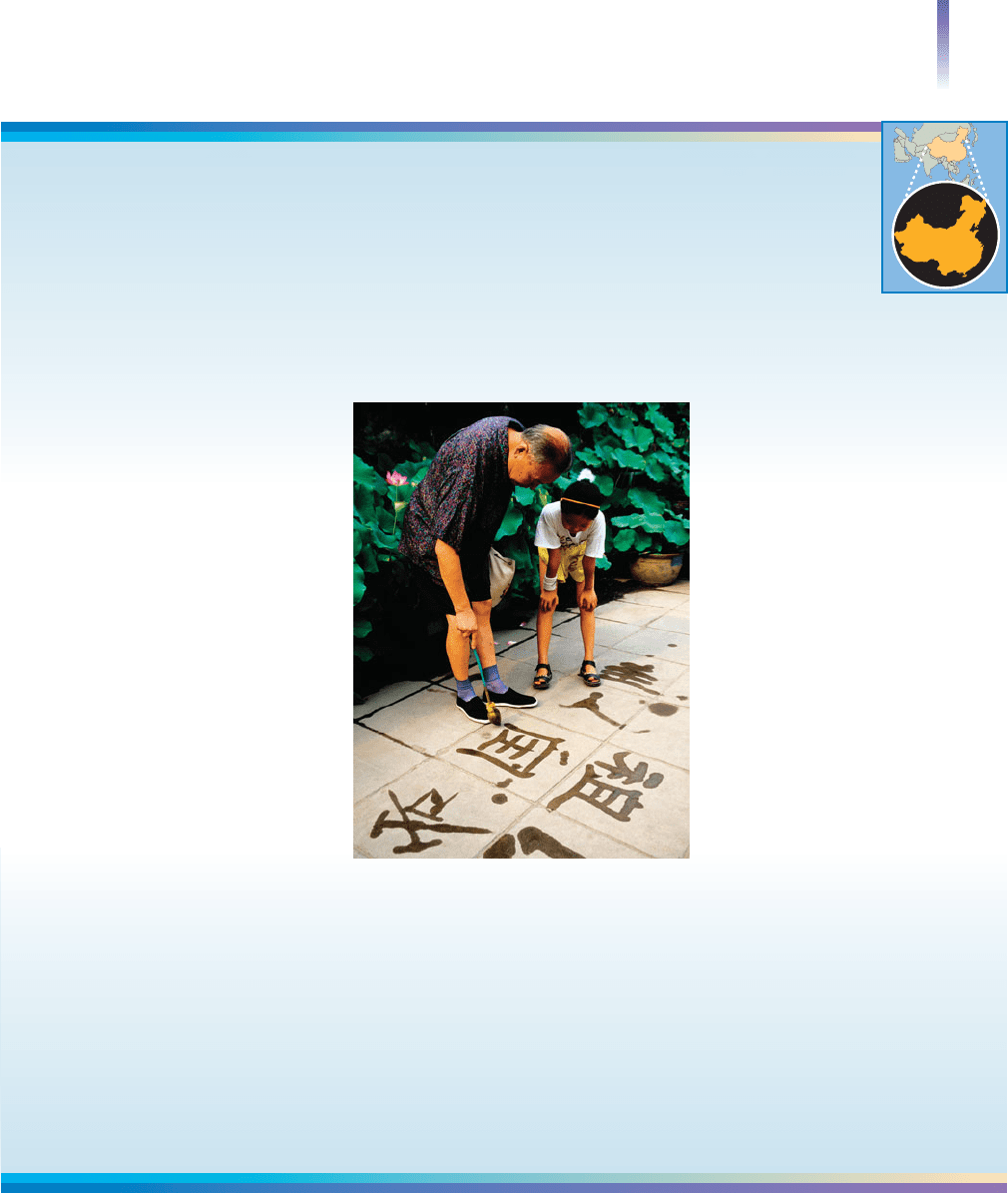Henslin James M. Sociology: A Down to Earth Approach
Подождите немного. Документ загружается.


Abstract 2011:Table 7). Despite this vast change, as Figure 13.5 shows, life expectancy
in the United States is far from the world’s highest. With its overall average of 82,
Japan holds this record.
As anyone who has ever visited Florida
has noticed, the elderly population is not
distributed evenly around the country.
(As Jerry Seinfeld sardonically noted,
“There’s a law that when you get old,
you’ve got to move to Florida.”) The
Social Map on the next page shows how
uneven this distribution is.
Race–Ethnicity and Aging. Just as the
states have different percentages of elderly,
so do the racial–ethnic groups that make
up the United States. As you can see from
Table 13.1, whites have the highest percent-
age of elderly and Latinos the lowest. The
difference is so great that the proportion of
elderly whites (15.3 percent) is almost three
Aging in Global Perspective 371
Japan
Australia
Canada
France
Italy
Spain
Holland
Germany
Great Britain
South Korea
United States
South Africa
Nigeria
Afghanistan
Niger
Malawi
Mozambique
Zimbabwe
0
10 20 30 40 50
Years
60
70 80 90 100
82.2 years
The World’s Longest Life Expectancy (78 and higher)
The World’s Shortest Life Expectancy (below 50)
81.7 years
81.3 years
81.1 years
80.3 years
81.1 years
79.6 years
79.1 years
79.9 years
78.8 years
78.4 years
47.2 years
49.2 years
45.1 years
44.8 years
44.1 years
41.4 years
40.2 years
FIGURE 13.5 Life Expectancy in Global Perspective
Note: The countries listed in the source with a life expectancy higher than the United States and those with a life
expectancy less than 50 years. The totals are for year 2010. All the countries in the top group are industrialized, and none
of those in the bottom group is.
Source: By the author. Based on Statistical Abstract of the United States 2011:Table 1338.
TABLE 13.1 Race–Ethnicity and Aging
Total 65
and Over
AGE
Median 65–74 75–84 85⫹
Whites 41.2 8.2% 5.3% 2.2% 15.8%
Asian Americans 35.3 5.4% 3.0% 1.1% 9.6%
African Americans 31.3 4.9% 2.8% 0.9% 8.6%
Native Americans 29.5 4.4% 2.2% 0.7% 7.3%
Latinos 27.4 3.2% 1.8% 0.7% 5.7%
U.S.Average 36.8 6.7% 4.2% 1.8% 12.9%
Source: By the author. Based on Statistical Abstract of the United States 2011:Table 10.

times that of Latinos (5.5 percent). The percentage of older Latinos is small because so many
younger Latinos have migrated to the United States. Differences in cultural attitudes about
aging, family relationships, work histories, and health practices will be important areas of so-
ciological investigation in coming years.
Although more people are living to old age, the maximum length of life possible, the life
span, has not increased. No one knows, however, just what that maximum is. We do know
that it is at least 122, for this was the well-documented age of Jeanne Louise Calment of
France at her death in 1997. If the birth certificate of Tuti Yusupova in Uzbekistan proves to
be genuine, her age of 128 would indicate that the human life span may exceed even this num-
ber by a comfortable margin. It is also likely that advances in genetics will extend the human
life span—perhaps to hundreds of years—a topic we will return to later. For now, let’s see the
different pictures of aging that emerge when we apply the three theoretical perspectives.
The Symbolic Interactionist Perspective
We saw how industrialization changed the way earlier Americans viewed the elderly. To
see how social factors affect our own views, let’s begin by asking how culture “signals” to
people that they are “old.” Then let’s consider how ideas about the elderly are changing
and how stereotypes and the mass media influence our perceptions of aging.
When Are You “Old”?
Changing Perceptions as You Age. You probably can remember when you thought that
a 12-year-old was “old”—and anyone older than that, beyond reckoning. You probably
were 5 or 6 at the time. Similarly, to a 12-year-old, someone who is 21 seems “old.” To
someone who is 21, 30 may mark the point at which one is no longer “young,” and 40
may seem very old. As people add years, “old” gradually recedes further from the self. To
people who turn 40, 50 seems old; at 50, the late 60s look old—not the early 60s, for the
passing of years seems to accelerate as we age, and at 50 age 60 doesn’t seem so far away.
In Western culture, most people have difficulty applying the label “old” to themselves.
In the typical case, they have become used to what they see in the mirror. The changes
372 Chapter 13 THE ELDERLY
AK
VT
The younger states: 10.1% to 14.2%
The average states: 14.4% to 15.7%
The grayer states: 15.8% to 19.5%
UT
OH
SC
NC
VA
WA
OR
CA
NV
ID
MT
WY
AZ
NM
CO
ND
SD
NE
KS
OK
TX
MN
IA
MO
AR
LA
WI
IL
KY
TN
MS
AL
GA
FL
IN
MI
WV
PA
NY
ME
NH
MA
RI
CT
NJ
DE
MD
DC
HI
Percent Elderly
FIGURE 13.6 As Florida Goes, So Goes the Nation
Source: By the author. Based on Statistical Abstract of the United States 2011:Table 18. Projections
to 2015.
life span the maximum length
of life of a species; for humans,
the longest that a human has
lived

have taken place gradually, and each change, if it
has not exactly been taken in stride, has been ac-
commodated. Consequently, it comes as a shock
to meet a long-lost friend and see how much that
person has changed. At class reunions, each per-
son can hardly believe how much older the others
appear!
Four Factors in Our Decision. If there is no
fixed age line that people cross, then what makes
someone “old”? Sociologists have identified sev-
eral factors that spur people to apply the label
of old to themselves.
The first factor is biology. One person may ex-
perience “signs” of aging earlier than others: wrin-
kles, balding, aches, difficulty in doing something
that he or she used to take for granted. Conse-
quently, one person will feel “old” at an earlier or
later age than others.
A second factor is personal history or biogra-
phy. An accident that limits someone’s mobility,
for example, can make that person feel old sooner
than others. Or consider a woman who gave birth
at 16 and has a daughter who, in turn, has a child
at 18. She has become a biological grandmother at age 34. It is most unlikely, however, that
she will play any stereotypical role—spending the day in a rocking chair, for example—but
knowing that she is a grandmother has an impact on her self-concept. At a minimum, she
must deny that she is old.
Then there is gender age, the relative value that a culture places on men’s and women’s
ages. For example, graying hair on a man, and even a few wrinkles, may be perceived as
signs of “maturity,” while on a woman, those same features may indicate that she is getting
“old.” “Mature” and “old,” of course, carry different meanings; most of us like to be called
mature, but few of us like to be called old. Similarly, around the world, most men are able
to marry younger spouses than women can. Maria might be an exception and marry Bill,
who is fourteen years younger than she. But in most marriages in which there is a fourteen-
year age gap, the odds greatly favor the wife being the younger of the pair. This is not bi-
ology in action; rather, it is the social construction of appearance and gender age.
The fourth factor in deciding when people label themselves as “old” is timetables, the
signals societies use to inform their members that old age has begun. Since there is no au-
tomatic age at which people become “old,” these timetables vary around the world. One
group may choose a particular birthday, such as the 60th or 65th, to signal the onset of
old age. Other groups do not even have birthdays, making such numbers meaningless. In
the West, retirement is sometimes a cultural signal of the beginning of old age—which is
one reason that some people resist retirement.
Changing Perceptions of the Elderly
At first, the audience sat quietly as the developers explained their plans to build a high-rise
apartment building. After a while, people began to shift uncomfortably in their seats. Then
they began to show open hostility.
“That’s too much money to spend on those people,” said one.
“You even want them to have a swimming pool?” asked another incredulously.
Finally, one young woman put their attitudes in a nutshell when she asked, “Who wants
all those old people around?”
When physician Robert Butler (1975, 1980) heard these complaints about plans to build
apartments for senior citizens, he began to realize how deeply antagonistic feelings toward the
elderly can run. He coined the term ageism to refer to prejudice, discrimination, and hostil-
ity directed against people because of their age. Let’s see how ageism developed in U.S. society.
The Symbolic Interactionist Perspective 373
At age 115, Gertrude Baines is the world’s oldest living person. Baines, whose
parents were former slaves, was born in Georgia in 1894. The world’s record for
age that has been documented by a birth certificate is held by Jeanne Calment
of France who died in 1997 at the age of 122.
gender age the relative value
placed on men’s and women’s
ages
ageism prejudice, discrimina-
tion, and hostility directed
against people because of their
age; can be directed against any
age group, including youth

Shifting Meanings. As we have seen, there is nothing inherent in old
age to produce any particular attitude, negative or not. Some histori-
ans point out that in early U.S. society old age was regarded positively
(Cottin 1979; Fleming et al. 2003). In colonial times, growing old was
seen as an accomplishment because so few people made it to old age.
With no pensions, the elderly continued to work at jobs that changed
little over time. They were viewed as storehouses of knowledge about
work skills and sources of wisdom about how to live a long life.
The coming of industrialization eroded these bases of respect. The
better sanitation and medical care allowed more people to reach old
age, and no longer was being elderly an honorable distinction. In-
dustrialization’s new forms of mass production also made young
workers as productive as the elderly. Coupled with mass education,
this stripped away the elderly’s superior knowledge (Cowgill 1974;
Hunt 2005). In the Cultural Diversity box on the next page, you can
see how a similar process is now occurring in China as it, too, indus-
trializes.
A basic principle of symbolic interactionism is that we perceive
both ourselves and others according to the symbols of our culture.
What old age means to people has followed this principle. When the
meaning of old age changed from an asset to a liability, not only did
younger people come to view the elderly differently but the elderly
also began to perceive themselves in a new light. This shift in mean-
ing is demonstrated in the way people lie about their age: They used
to claim that they were older than they were, but now they say that
they are younger than they are (Clair et al. 1993).
Once again, the meaning of old age is shifting—and this time in
a positive direction. This is largely because most of today’s U.S. eld-
erly can take care of themselves financially, and many are well-off. As
the vast numbers of the baby boom generation enter their elderly
years, their better health and financial strength will contribute to still
more positive images of the elderly. If this symbolic shift continues,
the next step—now in process—is to celebrate old age as a time of re-
newal. Old age will be viewed not as a period that precedes death,
but, rather, as a new stage of growth.
Even in scholarly theories, perceptions of the elderly have become
more positive. A theory that goes by the mouthful gerotranscendence was developed by
Swedish sociologist Lars Tornstam. The thrust of this theory is that as people grow old they
transcend their more limited views of life. They become less self-centered and begin to feel
more at one with the universe. Coming to see things as less black and white, they develop
more subtle ways of viewing right and wrong and tolerate more ambiguity (Manheimer
2005; Wadensten 2007). This theory is not likely to be universal. I have seen some eld-
erly people grow softer and more spiritual, but I have also seen others grow bitter, close
up, and become even more judgmental of others. The theory’s limitations should become
apparent shortly.
374 Chapter 13 THE ELDERLY
When does old age begin? And what activities are
appropriate for the elderly? From this photo that I took
of Munimah, a 65-year-old bonded laborer in Chennai,
India, you can see how culturally relative these questions
are. No one in Chennai thinks it is extraordinary that
this woman makes her living by carrying heavy rocks all
day in the burning, tropical sun.Working next to her in
the quarry is her 18-year-old son, who breaks the rocks
into the size that his mother carries.
Stereotypes, which play such a profound role in social life, are a basic area of sociological investigation. In
contemporary society, the mass media are a major source of stereotypes.

The Symbolic Interactionist Perspective 375
Cultural Diversity around the World
China: Changing Sentiment
About the Elderly
A
s she contemplates her future, Zhao Chunlan, a
71-year-old widow, smiles shyly, with evident
satisfaction. She has heard about sons abandon-
ing their aged parents. She has even
heard whispering about abuse.
But Zhao has no such fears.
It is not that her son is so devoted
that he would never swerve from his
traditional duty to his mother. Rather,
it is a piece of paper that has eased
Zhao’s mind. Her 51-year-old son has
signed a support agreement: He will
cook her special meals, take her to
medical checkups, even give her the
largest room in his house and put the
family’s color television in it (Sun 1990).
The high status of the elderly in
China is famed around the world: The
elderly are considered a source of wis-
dom, given honored seating at both
family and public gatherings—even ven-
erated after death in ancestor worship.
Although this outline may represent
more ideal than real culture, it appears
to generally hold true—for the past,
that is. Today, the authority of elders has
eroded, leading to less respect from the
adult children (Yan 2003; Fan 2008). For some, the cause is
the children’s success in the new market economy, which
places them in a world unknown to their parents (Chen
2005). But other structural reasons are also tearing at the
bonds between generations, especially the longer life ex-
pectancy that has come with industrialization. The change
is startling: In 1950, China’s life expectancy was 41 years.
It has now jumped to 70 years (Li 2004). China’s elderly
population is growing so rapidly that the
country has 114 million elderly—8.6
percent of its population (Statistical Abstract
2011:Table 1333).
China’s policy that allows each married couple only
one child has created a problem for the support of the
elderly. With such small families, the responsibility for
supporting aged parents falls on
fewer shoulders. The problem is
that many younger couples must
now support four elderly parents
(Zhang and Goza 2007). Try put-
ting yourself in that situation, and
see how it would interfere with
your plans for life. Can you see
how it might affect your attitudes
toward your aging parents—and
toward your in-laws?
Alarmed by signs that parent–
child bonds are weakening, some
local officials require adult children
to sign support agreements for
their aged parents. One province
has come up with an ingenious de-
vice: To get a marriage license, a
couple must sign a contract pledg-
ing to support their parents after
they reach age 60 (Sun 1990).“I’m
sure he would do right by me, any-
way,” says Zhao,“but this way I
know he will.”
For Your Consideration
Do you think we could solve our Social Security crisis
by requiring adult children to sign a parental support
agreement in order to get a marriage license? Why or
why not? What do you think Chinese officials can do to
solve the problem of supporting these huge and grow-
ing numbers?
This grandfather in Beijing is teaching calligraphy
to his granddaughter. As China industrializes and
urbanizes, its society is changing, including the
structure of relationships that nurture the elderly.
China
China
The Influence of the Mass Media
In Chapter 3 (pages 78–80), we noted that the mass media help to shape our ideas about both
gender and relationships between men and women. As a powerful source of symbols, the
media also influence our ideas of the elderly, the topic of the Mass Media box on the next page.
In Sum: Symbolic interactionists stress that old age has no inherent meaning. There
is nothing about old age to automatically summon forth responses of honor and re-
spect, as with the Abkhasians, or any other response. Culture shapes how we perceive
the elderly, including the way we view our own aging. In short, the social modifies the
biological.

376 Chapter 13 THE ELDERLY
MASS MEDIA In
SOCIAL LIFE
The Cultural Lens: Shaping Our
Perceptions of the Elderly
T
he mass media profoundly influence our percep-
tion of others.What we hear and see on televi-
sion and in the movies, the songs we listen to, the
books and magazines we read—all become part of the
cultural lens through which we view the world. Without
our knowing it, the media subtly shape our images of
people. They influence how we view minorities and dom-
inant groups; men, women, and children; people with dis-
abilities; people from other cultures—and the elderly.
The shaping of our images and perception of the eld-
erly is subtle, so much so that it usually occurs without
our awareness. The elderly, for example, are underrep-
resented on television and in most popular magazines.
This leaves a covert message—that the elderly are of lit-
tle consequence and can be safely ignored.
The media also reflect and reinforce stereotypes of
gender age. Older male news anchors are likely to be re-
tained, while female anchors who turn the same age are
more likely to be transferred to less visible positions.
Similarly, in movies older men are more likely to play ro-
mantic leads—and to play them opposite much younger
rising stars.
Although usually subtle, the message is not lost. The
more television that people watch, the more they per-
ceive the elderly in negative terms. The elderly, too, in-
ternalize these negative images, which, in turn, influences
the ways they view themselves. These images are so
powerful that they affect the elderly’s health, even the
way they walk (Donlon et al. 2005).
We become fearful of growing old, and we go to
great lengths to deny that this is happening to us. Fear
and denial play into the hands of advertisers, of course,
who exploit our concerns about losing our youth.
They help us deny this biological reality by selling us hair
dyes, skin creams, and other products that are designed
to conceal even the appearance of old age. For these
same reasons, plastic surgeons do a thriving business as
they remove telltale signs of aging.
The elderly’s growing numbers and affluence translate
into economic clout and political power. It is inevitable,
then, that the media’s images of the elderly will change.
An indication of that change is shown in the photo above.
For Your Consideration
What other examples of fear and denial of growing old
are you familiar with? What examples of older men play-
ing romantic leads with younger women can you give?
Of older women and younger men? Why do you think
we have gender age?
In some cultures, Demi Moore, 44, would be con-
sidered elderly. Moore is shown here with her hus-
band, Ashton Kutcher, 29. Almost inevitably,
when there is a large age gap between a husband
and wife, it is the husband who is the older one.
The marriage of Kutcher and Moore is a reversal
of the typical pattern of gender age.
The Functionalist Perspective
Functionalists analyze how the parts of society work together. Among the components of
society are age cohorts—people who were born at roughly the same time and who pass
through the life course together. Although you don’t see them, age cohorts have a huge
impact on your life. When you finish college, for example, if the age cohort nearing re-
tirement is large (a “baby boom” generation), more jobs will be available. In contrast, if
it is a small group (a “baby bust” generation), fewer jobs open up. Let’s look at theories
that focus on how people adjust to retirement.
age cohort people born at
roughly the same time who
pass through the life course
together

Disengagement Theory
Think about how disruptive it would be if the elderly left their jobs only when they died
or became incompetent. How does society get the elderly to leave their positions so
younger people can take them? According to disengagement theory, developed by Elaine
Cumming and William Henry (1961), this is the function of pensions. Pensions get the
elderly to disengage from their positions and hand them over to younger people. Retire-
ment, then, is a mutually beneficial arrangement between two parts of society.
Cumming (1976) also examined disengagement from the individual’s perspective.
She pointed out that people start to disengage long before retirement. During middle
age, they sense that the end of life is closer than its start. As they realize that their time
is limited, they begin to assign priority to goals and tasks. Disengagement begins in
earnest when their children leave home and increases with retirement and eventually
widowhood.
Changing Forms of “Disengagement.” And how do the elderly “disengage” today? Few quit
their jobs and sit in rocking chairs watching the world go by. With computers, the Internet,
and new types of work, the dividing line between work and retirement has blurred. Less
and less does retirement mean an end to work. Millions of workers just slow down. Some
stay at their jobs, but put in fewer hours. Others work as consultants part-time. Some switch
careers, even though they are in their 60s, some even in their 70s. Many never “retire”—at
least not in the sense of sinking into a recliner or being forever on the golf course.
Evaluation of the Theory. Disengagement theory came under attack almost as soon as
the ink dried on the theorists’ paper. One of the main criticisms is that this theory con-
tains an implicit bias against older people—assumptions that the elderly disengage from
productive social roles and then sort of slink into oblivion (Manheimer 2005). Instead of
disengaging, say the critics, the elderly exchange one set of roles for another (Jerrome
1992). The elderly’s new roles, which often center on friendship, are no less satisfying to
them than their earlier roles. These new roles are less visible to researchers, however, who
tend to have a youthful orientation—and who show their bias by assuming that produc-
tivity is the measure of self-worth. If disengagement theory is ever resurrected, it must also
come to grips with our new patterns of “disengagement.”
Activity Theory
Are retired people more satisfied with life?
(All that extra free time and not having to
kow-tow to a boss must be nice.) Are intimate
activities more satisfying than formal ones?
Such questions are the focus of activity the-
ory. Although we could consider this theory
from other perspectives, we are examining it
from the functionalist perspective because its
focus is how disengagement is functional or
dysfunctional.
Evaluation of the Theory. A study of retired
people in France found that some people are
happier when they are more active, but others
are happier when they are less involved (Keith
1982). Similarly, most people find informal,
intimate activities, such as spending time with
friends, to be more satisfying than formal
activities. But not everyone does. In one
study, 2,000 retired U.S. men reported for-
mal activities to be as important as informal
ones. Even solitary activities, such as doing
home repairs, had about the same impact as
The Functionalist Perspective 377
disengagement theory the
view that society is stabilized
by having the elderly retire
(disengage from) their posi-
tions of responsibility so the
younger generation can step
into their shoes
activity theory the view that
satisfaction during old age is re-
lated to a person’s amount and
quality of activity
Researchers are exploring factors that can make old age an enjoyable period of life,
those conditions that increase people’s mental, social, emotional, and physical well-
being. As research progresses, do you think we will reach the point where the
average old person will be in this woman’s physical condition?

intimate activities on these men’s life satisfaction (Beck and Page 1988). It is the same for
spending time with adult children. “Often enough” for some parents is “not enough” or
even “too much” for others. In short, researchers have discovered the obvious: What makes
life satisfying for one person doesn’t work for another. (This, of course, can be a source of
intense frustration for retired couples.)
Continuity Theory
Another theory of how people adjust to growing old is continuity theory. As its name im-
plies, the focus of this theory is on how the elderly maintain ties with their past (Kinsella
and Phillips 2005). When they retire, many people take on new roles that are similar to
the ones they gave up. For example, a former CEO might serve as a consultant, a retired
electrician might do small electrical repairs, or a pensioned banker might take over the fi-
nances of her church. Researchers have found that people who are active in multiple roles
(wife, author, mother, intimate friend, church member, etc.) are better equipped to han-
dle the changes that growing old entails. They have also found that with their greater re-
sources, people from higher social classes adjust better to the challenges of aging.
Evaluation of the Theory. The basic criticism of continuity theory is that it is too broad
(Hatch 2000). We all have anchor points based on our particular experiences in life, and
we all rely on them to make adjustments to the changes we encounter. This applies to peo-
ple of all ages beyond infancy. This theory is really a collection of loosely connected ideas,
with no specific application to the elderly.
In Sum: The broader perspective of the functionalists is how society’s parts work together
to keep society running smoothly. Although it is inevitable that younger workers replace
the elderly, this transition could be disruptive. To entice the elderly out of their positions
so that younger people can take over, the elderly are offered pensions. Functionalists also
use a narrower perspective, focusing on how individuals adjust to their retirement. The
findings of this narrower perspective are too mixed to be of much value—except that peo-
ple who have better resources and are active in multiple roles adjust better to old age
(Crosnoe and Elder 2002).
Because U.S. workers do not have to retire by any certain age, it is also important to study
how people decide to keep working or to retire in the first place. After they retire, how do they
reconstruct their identities and come to terms with their changed life? As the United States
grows even grayer, these should prove productive areas of sociological theory and research.
The Conflict Perspective
As you know, the conflict perspective’s guiding principle of social life is how social groups
struggle to control power and resources. How does this apply to society’s age groups? Re-
gardless of whether the young and old recognize it, say conflict theorists, they are oppo-
nents in a struggle that threatens to throw society into turmoil. Let’s look at how the
passage of Social Security legislation fits the conflict view.
Fighting for Resources: Social Security Legislation
In the 1920s, before Social Security provided an income for the aged, two-thirds of all cit-
izens over 65 had no savings and could not support themselves (Holtzman 1963; Crossen
2004a). The fate of workers sank even deeper during the Great Depression, and in 1930
Francis Townsend, a physician, started a movement to rally older citizens. He soon had
one-third of all Americans over age 65 enrolled in his Townsend Clubs. They demanded
that the federal government impose a national sales tax of 2 percent to provide $200 a
month for every person over 65 ($2,100 a month in today’s money). In 1934, the
Townsend Plan went before Congress. Because it called for such high payments and many
were afraid that it would destroy people’s incentive to save for the future, members of
378 Chapter 13 THE ELDERLY
continuity theory the focus
of this theory is how people
adjust to retirement by contin-
uing aspects of their earlier
lives

Congress looked for a way to reject the plan without appearing to oppose the elderly.
When President Roosevelt announced his own, more modest Social Security plan in 1934,
Congress embraced it (Schottland 1963; Amenta 2006).
To provide jobs for younger people, the new Social Security law required that work-
ers retire at age 65. It did not matter how well people did their work, or how much they
needed the pay. For decades, the elderly protested. Finally, in 1986, Congress eliminated
mandatory retirement. Today, almost 90 percent of Americans retire by age 65, but most
do so voluntarily. No longer can they be forced out of their jobs simply because of their
age. Let’s look at what has happened to this groundbreaking legislation since it was
passed.
The Conflict Perspective 379
ThinkingCRITICALLY
The Social Security Trust Fund: There Is No Fund,
and You Can’t Trust It
E
ach month, the Social Security Administration mails checks to 50 million people.
Across the country, 205 million U.S. workers pay into the Social Security system, look-
ing to it to provide for their basic necessities—and even a little more than that—in
their old age (Statistical Abstract 2011:Tables 542, 543).
How dependable is Social Security? The short answer is “Don’t bet your old age on it.”
The first problem is well known. Social Security is not a bank account. The money taken
from our checks is not deposited into our individual accounts. No money in the Social Se-
curity system is attached to anyone’s name. At retirement, we don’t withdraw the money
we paid into Social Security. Instead, the government writes checks on money that it col-
lects from current workers. When these workers retire, they, too, will be paid, not from
their own savings, but from money collected from others who are still working.
The Social Security system is like a giant chain letter—it works as long as enough new
people join the chain. If you join early enough, you’ll collect more than you paid in—but if
you join toward the end, you’re sim-
ply out of luck.And, say some con-
flict theorists, we are nearing the
end of the chain.The shift in the
dependency ratio—the number
of people who collect Social Secu-
rity compared with the number of
workers who contribute to it—is
especially troubling.As Figure 13.7
shows, sixteen workers used to
support each person who was col-
lecting Social Security. Now the
dependency ratio has dropped to
four to one. In another generation,
it could hit two to one. If this hap-
pens, Social Security taxes could
become so high that they stifle the
country’s economy.To prevent
this, Congress raised Social Secu-
rity taxes and established a Social
Security trust fund. Supposedly,
this fund has trillions of dollars.
But does it?
16
4
2?
1950
2000
2030
Number of workers
who pay into Social
Security for each
beneficiary
FIGURE 13.7 Fewer Workers
to Support the Retired
Source: By the author. Based on Social Security
Administration; Statistical Abstract of the United States
2011:Tables 542, 543.
dependency ratio the num-
ber of workers who are
required to support each
dependent person—those 65
and older and those 15 and
under

380 Chapter 13 THE ELDERLY
This question takes us to the root of the crisis, or, some would say, the fraud. In 1965, Pres-
ident Lyndon Johnson was bogged down in a war in Vietnam. To conceal the war’s costs from
the public, he arrived at the diabolical solution of forcing the Social Security Administration to
invest only in U.S.Treasury bonds, a form of government IOUs. This put the money collected
for Social Security into the general fund, where Johnson could siphon it off to finance the war.
Politicians love this easy source of money, and they continue the fraud. They use the term “off
budget” to refer to the Social Security money they spend. And each year, they spend it all.
Suppose that you buy a $10,000 U.S. Treasury bond. The government takes your
$10,000 and hands you a document that says it owes you $10,000 plus interest. This is how
Social Security works. The Social Security Administration (SSA) collects the money from
workers, pays the retired, disabled, and survivors of deceased workers, and then hands the
excess over to the U.S. government. The government, in turn, gives IOUs to the SSA in the
form of U.S.Treasury bonds. The government spends the money on whatever it wants—
whether that means building roads and schools, subsidizing tobacco crops, or buying bombs
and fighting a war in some far off place.
Suppose you are spending more money than you make. You talk Aunt Mary into loaning
you some money, and you give her an IOU. If you don’t count what you owe Aunt Mary, you
have a surplus. The government simply does not count those huge IOUs that it owes the
elderly. Instead, it reports a fake surplus to the public.
This arrangement is a politician’s dream. Politicians grab the money from the workers and
hand the workers giant IOUs. And then they pretend that they haven’t even spent that money.
The Gramm-Rudman law, which was designed to limit the amount of federal debt, does
not count the money that the government “borrows” from Social Security. It is as though
the debt owed to Social Security does not exist—and to politicians it doesn’t. To politicians,
Social Security is a magical money machine. A wave of their magical wand produces billions
from thin air. Are those just numbers on paper? Or are they money that has been confis-
cated from workers? Ask workers whose paychecks are hit by that magical wand.
One analyst (Sloan 2001) put the matter pithily:“The Social Security trust fund isn’t
a fund, and you shouldn’t trust it.”
For Your Consideration
Here are two proposals to solve this problem.
1. Raise the age at which Social Security payments begin to 70.
2. Keep the retirement age the same, but put what workers pay as Social Security taxes
into their own individual retirement accounts. Most proposals to do this lack controls to
make the system work. Here are controls:A board, independent of the government,
would select money managers to invest these accounts in natural resources, real estate,
stocks, and bonds—both foreign and domestic.Annually, the board would review the
performance of each money manager, retaining those who do the best job and replacing
the others. All investment results would be published, and individuals could select the
management team that they prefer. No one could withdraw funds before retirement.
How about your own Social Security? Do you prefer to retain the current system? Do
you prefer one of these two proposals? Neither is perfect. What problems might each have?
Can you think of a better alternative?
Sources: Smith 1986; Hardy 1991; Genetski 1993; Stevenson 1998; Statistical Abstract 2011. Government publications
that list Social Security receipts as deficits can be found in Monthly Treasury Statement of Receipts and Outlays, the
Winter Treasury Bulletin, and the Statement of Liabilities and Other Financial Commitments of the United States Government.
Intergenerational Competition and Conflict
Social Security came about not because the members of Congress had generous hearts, but
out of a struggle between competing interest groups. As conflict theorists stress, equilib-
rium between competing groups is only a temporary balancing of oppositional forces,
